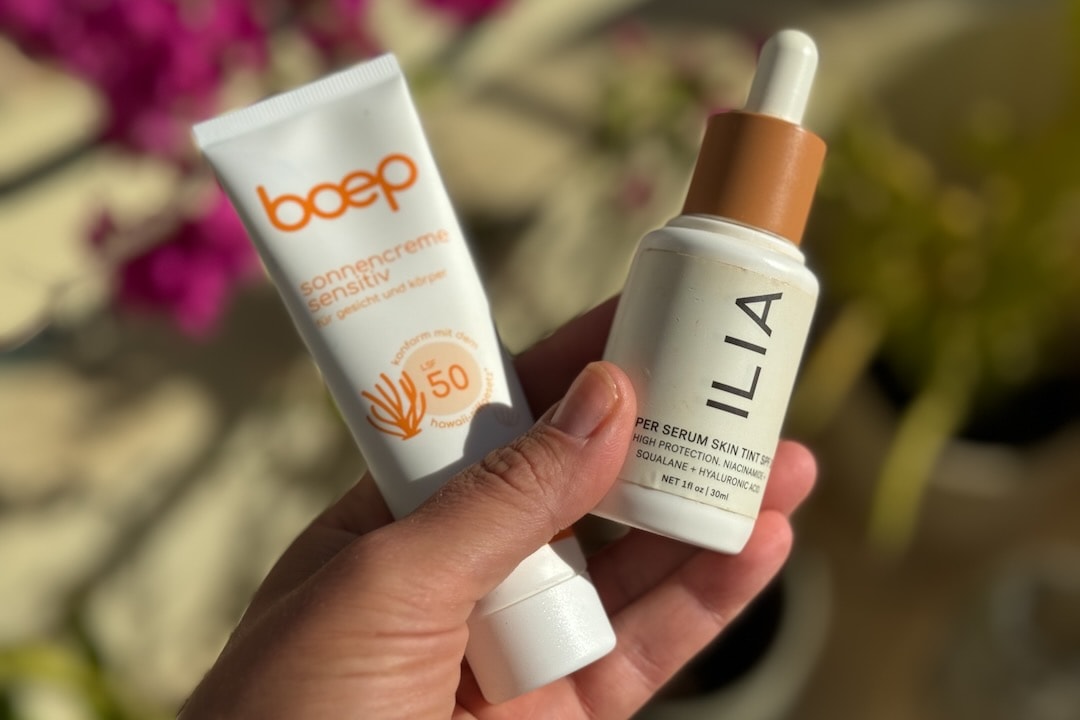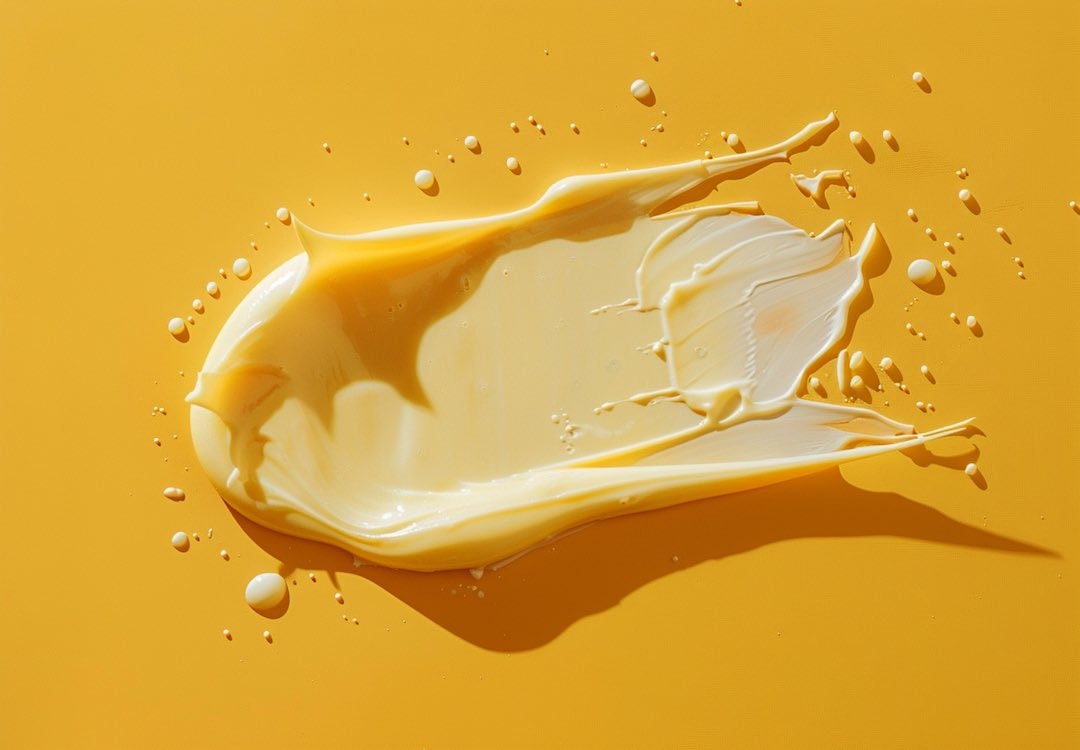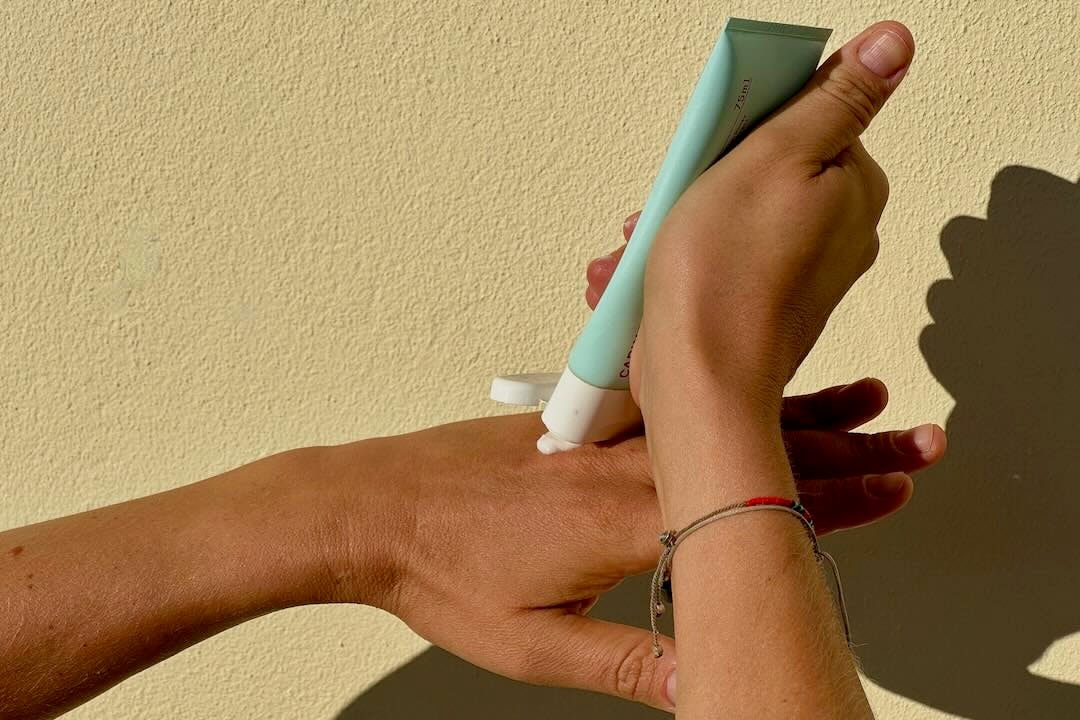Table of Contents
What’s a Mineral Sunscreen? Your Guide to Safe, Effective Sun Protection
This page may contain affiliate links. We may earn a commission on purchases, at no additional cost to you. Learn more →
What's a mineral sunscreen, and why should you care? If you're like me, you've probably avoided daily sunscreen, cringing at the thought of chemical compounds on your skin. But here's the fact: sun protection isn't just important, it's essential for our health and well-being when being exposed to direct sun for hours.
Did you know that one in five Americans will develop skin cancer before 70? While seeking shade or wearing UV protective clothing creates a physical defense against harmful UV rays, daily sunscreen is our shield against UV rays, skin cancer, wrinkles, and dark spots.
Daily use protects your skin year-round, and it's a crucial part of any anti-aging routine. Sun exposure is the #1 cause of aging, responsible for 90% of visible skin changes over time.
As someone passionate about non-toxic living, I've made efforts to find ways to protect my skin without compromising my health. That's where mineral sunscreens come in—they're game-changers in safe sun protection.
In this guide, we'll explore the world of mineral sunscreens. You'll learn what they are, how they work their magic, and why they differ from chemical alternatives. I'll share the benefits and challenges, plus my insider tips on choosing the perfect one for your unique skin.

What is a Mineral Sunscreen?
Mineral sunscreens AKA physical sunscreens offer mineral protection from the sun's damaging rays the non-toxic formula is creating a physical separation on your skin from the sun's damaging UV rays. Unlike chemical sunscreens, mineral sunscreens use natural ingredients like zinc oxide and titanium dioxide to reflect and scatter UV radiation. Think of it as a microscopic shield, bouncing those damaging rays away from your skin.
How does Mineral Sunscreen Work?
Imagine your skin wrapped in an invisible, protective mirror. That's essentially how mineral sunscreen functions:
-
Physical Barrier: The active ingredients, zinc oxide, and titanium dioxide, sit on top of your skin rather than being absorbed.
-
Broad-Spectrum Protection: These minerals effectively deflect both UVA (aging) and UVB (burning) rays, providing comprehensive defense.
-
Immediate Effectiveness: Because they work on the skin's surface, mineral sunscreens start protecting you the moment you apply them.
-
SPF Rating: The Sun Protection Factor (SPF) indicates how much longer you can stay in the sun without burning compared to unprotected skin.

Mineral Sunscreen Ingredients: Nature's Sun Shield
The star players in mineral sunscreens are zinc oxide and titanium dioxide. Let's break down their superpowers:
Zinc Oxide: The All-Rounder
-
Broad-Spectrum Protection: One of the few FDA-approved ingredients that protects across the full spectrum of UV light.
-
Non-Irritating: Gentle on the skin and less likely to cause irritation or allergic reactions, making it suitable for sensitive skin.
-
Non-Comedogenic: Doesn't clog pores, making it ideal for people with acne-prone or oily skin.
-
Water-resistant: Provides extended protection during swimming or sweating.
-
Eco-Friendly: Considered reef-safe, it doesn't harm coral reefs or marine life.
-
Anti-Inflammatory: Has soothing and anti-inflammatory properties.
-
Safe for Long-Term Use: Considered a safe and effective ingredient for daily use.
Titanium Dioxide:
-
UV Protection: Primarily protects against UVB rays and short-wave UVA rays.
-
Gentle on Skin: Safe for sensitive skin, often found in products for people with reactive skin.
-
Non-comedogenic: Suitable for acne-prone or oily skin.
-
Immediate Protection: Doesn’t need to be absorbed, physically sits on the skin's surface to deflect UV rays.
-
Reef-Safe: Doesn’t harm marine ecosystems or coral reefs.
-
Stable in Sunlight: Photostable and maintains its effectiveness over time.
-
Lightweight and Non-Greasy: Tends to have a lightweight texture.
Considerations for Use
Titanium dioxide is a superstar when it comes to safe sun protection, but there are a few things to keep in mind. While it’s great for your skin, especially in sunscreen, the concern arises when it’s used in nanoparticle form—particularly in spray sunscreens. Inhaling these tiny particles could potentially cause oxidative stress and inflammation, which is why it’s best to stick to non-spray formulas for a safer application.
The good news? Regulatory bodies, like the FDA, deem titanium dioxide perfectly safe for topical use in sunscreens. Its minimal absorption through the skin makes it an effective, low-risk choice. For an extra layer of safety, look for products that use coated titanium dioxide to further reduce the chance of free radicals forming.
Natural Oils
Many mineral sunscreens incorporate additional natural ingredients to enhance protection and nourish your skin:
-
Coconut oil: Contains natural SPF properties, typically around SPF 4-6.
-
Almond Oil: Rich in vitamin E, it acts as an antioxidant to help protect skin.
-
Jojoba oil: Closely resembles human sebum, providing a protective barrier against moisture loss and environmental stressors.
-
Aloe Vera: Contains antioxidants and anti-inflammatory properties.
-
Shea butter: Provides moisturizing properties and helps create a protective layer on the skin.
-
Raspberry oil: Contains natural SPF properties (estimated SPF 28-50) due to its high concentration of polyphenols, offering protection against both UVA and UVB rays.
By combining these powerful minerals with nourishing natural oils, mineral sunscreens offer effective sun protection while caring for your skin and the environment.

Mineral or Chemical sunscreen?
So we understand the ingredients, but these are often found in hybrid and chemical sunscreens. So what's the difference? It's not only about these ingredients; there's a little more to it than that.
Hold on! What's hybrid sunscreen? Hybrid sunscreens offer mineral and chemical protection with a thinner formula.
While mineral sunscreen reflects UV rays, chemical sunscreen absorbs UV rays. Some ingredients you want to avoid that may appear in chemical and hybrid sunscreens are oxybenzone, octinoxate, parabens, and fragrances. These can mess with your hormones and irritate your skin.
According to the Environmental Working Group (EWG), the majority of chemical sunscreens on the market either provide inadequate sun protection or contain potentially concerning ingredients like:
-
Oxybenzone: Causes allergic skin reactions, and behaves like a hormone disruptor.
-
Octinoxate (Octyl methoxycinnamate): Has hormone effects on the metabolic system and affects thyroid hormone production.
-
Homosalate: Can penetrate the skin and disrupt hormones.
-
Octisalate: Possible linkage to allergic contact dermatitis.
-
Octocrylene: Potentially hormone-disrupting and unsafe for coral reefs.
-
Avobenzone: Can disrupt the endocrine system.
To ensure you're using a safe and effective mineral sunscreen, consider using the EWG's Skin Deep database or other reputable Ingredient Checker apps.
The FDA's sunscreen guidanceand the American Academy of Dermatology's recommendations are also great resources for more information.

Pros and cons of Mineral Sunscreen
When considering personal preferences for physical sun protection and different skin types there could be benefits and downsides you may want to think about.
Benefits of Using Mineral Sunscreens
-
Safe for sensitive skin
-
Broad-spectrum protection against UVA and UVB rays
-
Non-toxic formulation
-
Eco-friendly and reef-safe
-
Immediately effective upon application
Downsides to Using Mineral Sunscreen
-
Can feel thicker on the skin
-
May leave a white cast, especially on darker skin tones
-
Requires more frequent reapplication
-
Can be drying if used without moisturizer
Choosing the Right Mineral Sunscreen for Your SkinType
When selecting mineral or non-toxic sunscreens, the primary goal is to protect yourself from UV rays, as sun exposure can significantly increase the risk of skin cancer. By aligning your skin type with the appropriate sunscreen, you can effectively safeguard your skin. Always perform a patch test with new products to ensure compatibility with your skin.
Tips for Purchasing Mineral Sunscreen
-
Non-Comedogenic Formulas: Choose sunscreens that won't clog pores or cause breakouts.
-
Texture Considerations:
-
For oily skin, opt for mattifying formulas that help control shine.
-
For dry skin, look for sunscreens with hydrating ingredients like hyaluronic acid, ceramides, or shea butter.
-
For combination skin, consider sunscreens with a moisturizer like squalane, which is also beneficial for acne and eczema.
-
-
Antioxidant Protection: Sunscreens with added vitamin E or green tea extract offer extra antioxidant benefits.
-
For Darker Skin Tones: Select sunscreens containing zinc oxide and titanium dioxide in micronized or non-nano forms to minimize visibility on the skin.
How to Apply Mineral Sunscreen Correctly
Once you've chosen your mineral sunscreen, here are some tips to enhance your application experience:
-
Prep Your Skin: Cleanse and moisturize your skin with a clean moisturizer before applying sunscreen.
-
Apply Generously: Use about a nickel-sized amount for your face to ensure adequate coverage.
-
Reapply Often: Reapply every two hours or immediately after swimming or sweating.
-
Cover All Areas: Don't forget often-overlooked spots like your ears and neck, which can burn easily.

Key Takeaways
-
Mineral sunscreens are a safe, effective, and eco-friendly alternative to chemical sunscreens.
-
With active ingredients like zinc oxide and titanium dioxide, they provide broad-spectrum protection against UVA and UVB rays without harmful chemicals.
-
Although they may have drawbacks like a thicker consistency or potential white cast, the benefits of non-toxic sun protection outweigh these minor inconveniences.
-
By selecting the right formula for your skin type and applying it correctly, you can enjoy the sun safely while keeping your skin healthy and protected.
FAQ on Mineral Sunscreen
Can I use mineral sunscreen on my face?
Yes, mineral nontoxic face sunscreens are excellent for facial skin as they offer broad-spectrum protection and are gentle, making them ideal for sensitive, acne-prone, or irritated skin.
Can I use mineral sunscreen with makeup?
Many mineral sunscreens are designed to work well under makeup. Mineral-based powder sunscreens or setting sprays with SPF make it easier to reapply sunscreen without disturbing makeup.
Is mineral sunscreen better than chemical?
Mineral sunscreens can reduce the risk of skin irritation or dermatitis. They reflect UV rays, while chemical sunscreens absorb them.
How do I know if my sunscreen is mineral or chemical?
Check the active ingredients on the packaging. Ingredients like oxybenzone, octinoxate, and cinoxate indicate chemical sunscreens. Look for labels stating "mineral sunscreen" or "physical sunscreen," and if unsure, use a Cosmetics Ingredient Checker app.
Is mineral sunscreen safe for children?
Generally, mineral sunscreens are a safe and effective choice for protecting children's skin.













